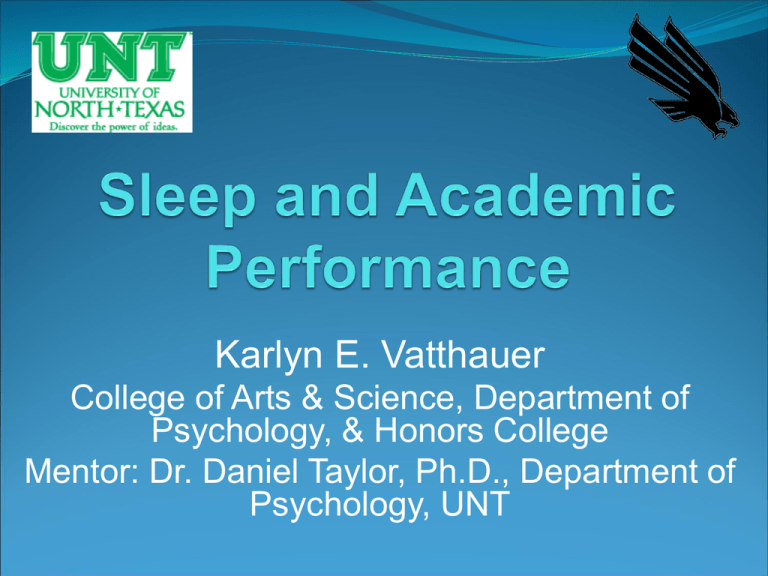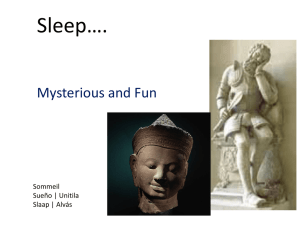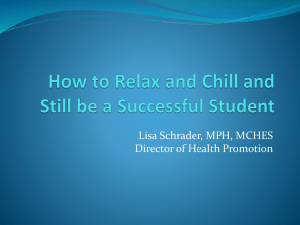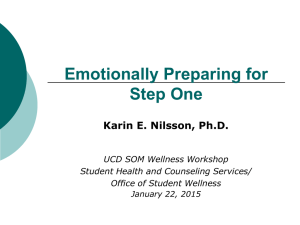Sleep and Academic Functioning - UNT Digital Library
advertisement

Karlyn E. Vatthauer College of Arts & Science, Department of Psychology, & Honors College Mentor: Dr. Daniel Taylor, Ph.D., Department of Psychology, UNT Research Topic The predictive relationship of sleep and academic performance (GPA). Vocabulary Traditional - variables that have commonly been shown to predict academic performance in previous research High school GPA, standardized test scores, ethnicity, gender, socioeconomic status Modifiable - variables that may be amenable to treatment to increase academic performance Alcohol/drug use, alcohol/drug disorder, anxiety, depression, sleep Purpose The intention of this project was to compare traditional and modifiable variables, specifically sleep, as predictors of GPA (cumulative & semester*). * Data not shown in this presentation Research Questions Is sleep significantly correlated with GPA? If yes, in what way? Is sleep a significant predictor of GPA when other variables are accounted for? Literature Review Several studies have shown a positive correlation between undergraduate academic performance (GPA) and postgraduate earnings (Filer 1981, 1983; Jones & Jackson, 1990; Pascarella & Terenzini, 2003; Wise, 1975). Colleges and universities rely very heavily on standardized test scores and high school grades to predict GPA. Literature Review When combined, HS GPA and standardized test scores only predict 25 % of GPA variance (ACT, 1997; Boldt, 1986; Mathiasen, 1984; Mouw & Khanna). In previous studies, gender, ethnicity, and socioeconomic status (SES) have predicted GPA (Betts & Morell, 1999; Peters, Joireman, & Ridgway, 2005). Literature Review Research has shown mixed results (negative relationship or no relationship) for alcohol use as a predictor of GPA (Paschall & Freisthler, 2003; Singleton, 2007). Chronic drug use leads to cognitive impairments on achievement tests (Block, Erwin, & Ghoneim, 2002; Hoshi, Mullins, Boundy, Brignell, Piccini, & Curran, 2007; Solowij et al., 2002). Literature Review Previous and current research has shown a positive relationship between anxiety disorders and GPA (Stringer, Crown, Lucas, & Supramanium, 1977). Research has yet to show whether a relationship exists between depression and GPA (Hysenbegasi, 2005; Svanum & Zody, 2001). Literature Review Research of sleep patterns and academic performance has been very limited. Most researchers use total sleep time to study differences in sleep patterns (Gau et. al, 2007; Peters et al., 2005; Thacher, 2008). There are many other sleep variables that can be studied: Time in bed, sleep efficiency, sleep onset latency, wake after sleep onset, time awake in morning, nap time, and number of awakenings Literature Review Sleep problems are a frequent occurrence within the college population (Forquer, Camden, Gabriau, & Johnson, 2008). These problems should affect more than the bedroom. Hypotheses Sleep pattern will be significantly correlated with GPA because it is a primary part of students’ lifestyles. Specifically, sleep onset latency, wake time after sleep onset, and time awake in morning will predict GPA. Sleep pattern will significantly predict GPA when all variables are accounted for. Sleep pattern will significantly predict GPA when traditional variables are removed. Methods Participants (N = 951) were recruited from undergraduate psychology classes at the University of North Texas. Participants completed a self-report health questionnaire packet and a week long sleep diary, available on the SONA system, an online research service. Students received four extra credit points towards their psychology class. Methods Demographics 74% were females Ethnicity 63% Caucasian 13% African-American 10% Hispanic-American 5% Asian/Pacific-Islander 1% Native American 4% other Academic rank 40% freshmen 27% sophomores 19% juniors 15% seniors Age (M = 20.3; SD = 3.9). Family income ( Mean = $100,000 - $149,000 (SD = 2.9) Data Analysis Multiple correlation Sleep pattern variables and GPA All other variables and GPA* Stepwise multiple regression Significant correlates and GPA** Significant modifiable variables and GPA *Data not shown in this presentation **Only sleep pattern variables shown Results Multiple correlation of sleep pattern and GPA Significant relationship between GPA and: Sleep onset latency (r = -.06, p < .05) Nap time (r = -.11, p < .01) Number of awakenings (r = .08, p < .05) Table 1 Summary of Stepwise Multiple Regression Analysis with Significant Correlates as Criterion Step Predictor Variable R² R² F β 6 NWAK .18 .01 5.93* .10** 7 NAP .19 .01 6.42* -.08* Note. NWAK = Number of Wakenings; NAP = Nap Time; PSS = Perceived stress scale *p < .05. **p < .01. Table 2 Summary of Stepwise Multiple Regression Analysis with Significant InterventionPossible Correlates as Criterion Step Predictor Variable R² R² F β 1 AUDIT .02 .02 20.26** -.12** 2 NAP .03 .01 11.44** -.11** 3 PSS .04 .01 9.20** -.11** 4 NWAK .06 .01 10.02** .11** 5 MPS .06 .01 5.07* -.08 * Note. AUDIT = Alcohol use disorders identification test; NAP = Nap Time; PSS = Perceived stress scale; NWAK = Number of Wakenings; MPS = Marijuana problem scale. *p < .05. **p < .01. Discussion Sleep pattern was significantly correlated with GPA. Specifically, sleep onset latency, nap time, and number of awakenings. Nap time and number of awakenings continued to be significant predictors of GPA after accounting for all other variables Each accounted for an additional 1% of GPA variance. Discussion Overall, of modifiable variables: Sleep variables accounted for 2% of GPA variance Alcohol use disorders 2% Trait stress 1% Marijuana use 1% Acknowledgements Dr. Daniel Taylor, Psychology Dr. Susan Eve, Associate Dean of the Honors College Dr. Gloria Cox, Dean of the Honors College Department of Psychology College of Arts and Science References Betts, J.R. & Morell, D. (1999). The determinants of undergraduate grade point average. The Journal of Human Resources, 34(2), 268-293. Block, R. I., Erwin, W. J., & Ghoneim, M. M. (2002). Chronic drug use and cognitive impairments. Pharmacology, Biochemistry & Behavior, 73(3), 491 Filer, R. K. (1981). The influence of effective human capital on the wage equation. In R. G. Ehrenberg (Ed.), Research in Labor Economics (pp. 367-416). Greenwich, CT: JAI Press. Forquer, L. M., Camden, A. E., Gabriau, K. M., & Johnson, C. M. Sleep patterns of college students at a public university. Journal of American College Health, 56(5), 563-365. Gau, S. F., Kessler, R. C., Tseng, W. L., Wu, Y. Y., Chiu, Y. N., Yeh, C. B., et al. (2007). Association between sleep problems and symptoms of attention-deficit/ hyperactivity disorder in young adults. Sleep, 30(2), 195-201. Hoshi, R., Mullins, K., Boundy, C., Brignell, C., Piccini, P., & Curran, H. V. (2007). Neurocognitive function in current and ex-users of ecstasy in comparison to both matched polydrug-using controls and drug-naïve controls. Psychopharmacology, 194, 371-379. Hysenbegasi, A., Hass, S., & Rowland, C. (2005, September). The impact of depression on the academic productivity of university students. Journal of Mental Health Policy and Economics, 8(3), 145-151. Jones, E. B. & Jackson J. D. (1990). College grades and labor market rewards. The Journal of Human Resources, 25(2), 253-266. References Paschall, M., & Freisthler, B. (2003, July). Does Heavy Drinking Affect Academic Performance in College? Findings from a Prospective Study of High Achievers?. Journal of Studies on Alcohol, 64(4), 515. Peters, B. R., Joireman, J. & Ridgway, R. L. (2005). Individual differences in the consideration of future consequences scale correlate with sleep habits, sleep quality, and GPA in university students. Psychological Reports, 96, 817-824. Robbins, S. B., Lauver, K., Le, H., Davis, D., Langley, R., Carlstrom, A. (2004). Do psychosocial and study skill factors predict college outcomes? A meta-analysis. Psychological Bulletin, 130(2), 261-288. Singleton, R. A. (2007). Collegiate alcohol consumption and academic performance. Journal of studies on alcohol & drugs, 68(4), 548-555. Solowij, N. et al. (2002). Cognitive functioning of long-term heavy cannabis users seeking treatment. JAMA: Journal of the American Medical Association, 287(9), 1123. Stringer, P., Crown, S., Lucas, C., & Supramanium, S. (1977). Personality correlates of study difficulty and academic performance in university students: I. The Middlesex Hospital Questionnaire and Dynamic Personality Inventory. British Journal of Medical Psychology, 50(3), 267-274. .Svanum, S., & Zody, Z. (2001). Psychopathology and college grades. Journal of Counseling Psychology, 48(1), 72-76. Thacher, P.V. (2008). University students and the “all nighter”: Correlates and patterns of students’ engagement in a single night of total sleep deprivation. Behavioral Sleep Medicine, 6, 16-31. Wise, D. A. (1975). Academic achievement and job performance. American Economic Review, 67(5), 949-958.



